Lily Iona MacKenzie's Blog, page 47
November 9, 2016
Trumping Trump: the Wrecking Ball Effect
Before going to sleep last night, I was pretty certain that Hilary would not prevail. Still, it was a shock to wake up to Neanderthal Donald Trump as the new president elect. After I unpeeled my flattened self from the floor, I began thinking about the bigger picture, and that helped me put what has had happened into a larger perspective.
Trump , a hollow man, has been the vessel for his unfiltered and unscripted unconscious. He conveys shadowy ideas and values that connect with similar notions in his viewers. In a way, he’s communicating directly with their unconscious, the effect being that he is stirring something deep within them, in psychoanalytic parlance, a kind of transference. That’s why he mesmerizes many of his followers, and they can’t see beyond what he projects on stage. Since many of them feel overlooked and are seeking a savior, Trump fills the role for them, becoming a kind of messiah figure they believe will lead them out of their misery and set America on the right track.
 I believe another dynamic is also going on. It doesn’t take a sociologist to see that our legislature has ossified, especially under Republican rule, though the Democrats are no less at fault. Gridlock. Inability to negotiate or to find common ground. An unwillingness to think deeply about issues and promote the larger good. These are only a few of our government’s problems.
I believe another dynamic is also going on. It doesn’t take a sociologist to see that our legislature has ossified, especially under Republican rule, though the Democrats are no less at fault. Gridlock. Inability to negotiate or to find common ground. An unwillingness to think deeply about issues and promote the larger good. These are only a few of our government’s problems.
Though I’m sure Trump didn’t enter this political campaign intending to do anything but win on his terms and attract the constant attention he so desperately needs, he has actually become a victim of his own emptiness. Since in certain ways, he isn’t directly part of the Washington problem, voters have installed him as president in order to be a wrecking ball that will blast through some of these rigidified systems and breath fresh life into the structures.
Trump’s MO is not playing by the rules (probably because he doesn’t understand them), so in his blundering way, he could cause unexpected situations that will create an opportunity for change to occur. Of course, that doesn’t mean these modifications will be welcome or constructive, but they could be an opportunity for something positive to emerge. Destruction is part of regeneration. It’s why new management can be such a threat. In order to make positive changes in an institution, something must die and be replaced before renewal can happen.
We writers can be effective during this time by reflecting on what is happening through poetry, satirical plays/stories, or essays/op ed columns and opinion pieces. Words do have power, as Trump has demonstrated, even when they are lies. They can be used as Trump does to deceive and mislead the vulnerable. Or they can build bridges and expose frauds, leading readers to deeper understandings of the various problems involved. In this way, we can turn this potentially negative time into something positive by harnessing our energy in creative, constructive ways that will not only nourish us but also feed our readers.
Filed under: Links Tagged: america, democrat, government, messiah, president, republican, savior, trump, wrecking ball








November 3, 2016
Play Day: Nurture Your Soul!
For years now, I’ve committed myself so completely to writing and marketing my work on social media and beyond that I rarely give myself a day off. All that has changed since my husband urged me to have at least one day a week when I do something different.
I didn’t need too much convincing. Since then, Sundays have become my play day. I don’t do any writing. I don’t go near social networking sites. My computer remains more or less silent except for my daily practice of recording dreams and journaling. And, of course, going to the gym is part of my Sunday ritual.
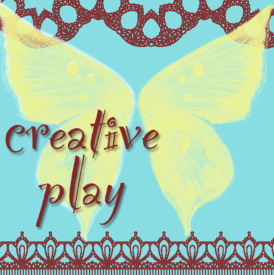
But afterward, I may read leisurely. I also head for my art table and see what attracts me there. On some days, I’ll do some collage. On others, I’ll mess around with either watercolors or acrylics. Or I might combine the two with other mediums, allowing myself to follow whatever impulse grabs me in the moment. Thus, I never know where exactly I’ll end up, and that’s part of the pleasure.
It’s also a major reason why I love writing. As with the visual arts, I have no idea where a poem, short story, or novel will end up, so each foray is an adventure into the unknown. Yet each medium offers a different result. Writing brings me closer to my more intellectual interests, expanding on my awareness of what is occupying me in any particular moment—ideas, themes, obsessions. On the other hand, the visual arts offer insight that is more difficult to articulate. I’m not interested in representational art, so much that I produce has to be interpreted: colors, lines, motions, and unexpected images arising from these efforts. Mysterious. And I love it.
I also leave time on Sundays to play the piano and sing, something I did for hours as a child, finding well-liked songs in songbooks and sheet music that occupied me for hours. Playing and singing has helped me to work out many difficult emotional moments, offering a satisfying way of expressing myself.
Having a day free from our usual activities isn’t just valuable for writers. All of us can benefit from a play day. As my husband said, make time in your week to nurture your soul. Great advice!
Filed under: Links Tagged: creating, drawing, music, painting, play day, writing

 [image error]
[image error]





November 2, 2016
Fling! by @lilyionamac is Available in #Audio! #literaryfiction #womensfiction #giveaway
Title: Fling! Author: Lily Iona MacKenzie Genre: Literary/Women’s Fiction/Humor Publisher: Pen-L Publishing Book Blurb: Fling! features 57-year-old Feather and her 90-year-old moth…
Source: Fling! by @lilyionamac is Available in #Audio! #literaryfiction #womensfiction #giveaway
Filed under: Links








October 25, 2016
The Monkey on Her Back by Lily Iona MacKenzie
It crept up on her, starting just before her 62nd birthday: something wasn’t quite right with her body. Her stomach felt gassy at times, bloated and unsettled. No pain. An old malady for her, perio…
Source: The Monkey on Her Back by Lily Iona MacKenzie
Filed under: Links








October 18, 2016
The Many Layers of Editing: Part Two
I’ve already submitted a post about the level of editing I’ve been enjoying for my novel Bone Songs, to be published in 2017. I don’t think I would have received such intense feedback if the novel had been published by a large press. While I’m extremely grateful for my publisher/editor’s attentiveness, at times I also feel overwhelmed by the number of comments she’s made that often go beyond suggestions and feel as if she’s taking over my manuscript. It’s a delicate balancing act on her part and on mine.
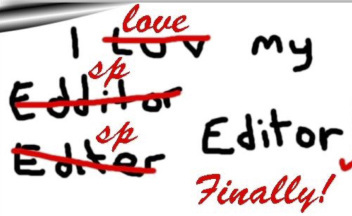 But her observations also are forcing me to reconsider or question aspects of the work that I have felt were finalized. That is the most painful part: as someone who has knitted in a past life, this process reminds me of what happens if you slip a stitch. The knitter can’t just keep going. She has to return to the place where the error occurred and start over from that point. It’s not a happy move. Yet ultimately, it will give a finished garment that looks professional, not something marred by many snags and snarls.
But her observations also are forcing me to reconsider or question aspects of the work that I have felt were finalized. That is the most painful part: as someone who has knitted in a past life, this process reminds me of what happens if you slip a stitch. The knitter can’t just keep going. She has to return to the place where the error occurred and start over from that point. It’s not a happy move. Yet ultimately, it will give a finished garment that looks professional, not something marred by many snags and snarls.
I’ve had to put my own role as writer aside and let the work itself have prominence. Otherwise, my ego gets too involved in the outcome and I won’t heed valuable criticisms that will improve the overall product.
Fine-tuning a novel takes not only an enormous amount of time but it also requires tremendous patience. Passages that had made perfect sense to me originally take on an opacity when viewed through an attentive reader’s periscope. Novel writers need to be prepared for this kind of scrutiny. We may feel we’ve hit all of the notes in our many drafts, but we also need to recognize our limitations.
It requires a skilled reader to help us see what we’ve missed. And humiliating as that may be, it’s an essential part of the writing craft. Being able to take good criticism and make it part of the final product.
Filed under: Links Tagged: bone songs, editing, writing








October 8, 2016
To Read Or Not To Read: Is That the Question?
In her 10/2/16 New York Times Book Review column, Anna Holmes states that readers should skip parts of a narrative, “particularly if an author is writing without clarity of purpose or showing off.” In general, I agree with this approach, especially if a writer is wasting my time as a reader by not fulfilling his/her responsibilities in crafting the novel. However, as I’ve told myself many times when I’ve become bogged down in a passage and wanted to escape, I may be missing something important that will illuminate the whole work. The problem may be more with me than with the writing. In certain cases, this has proven true, and I was grateful I had stayed involved.
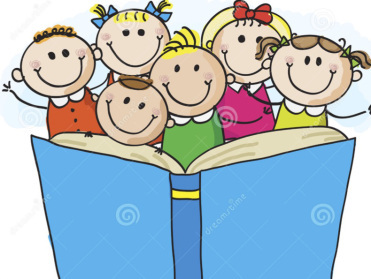 But there have been other times when moving on was exactly the right thing to do. I’m thinking of David Mitchell’s highly acclaimed work Cloud Atlas. Mitchell has been called “A postmodern visionary and one of the leading voices in twenty-first-century fiction, David Mitchell combines flat-out adventure, a Nabokovian love of puzzles, a keen eye for character, and a taste for mind-bending, philosophical and scientific speculation in the tradition of Umberto Eco, Haruki Murakami, and Philip K. Dick.”
But there have been other times when moving on was exactly the right thing to do. I’m thinking of David Mitchell’s highly acclaimed work Cloud Atlas. Mitchell has been called “A postmodern visionary and one of the leading voices in twenty-first-century fiction, David Mitchell combines flat-out adventure, a Nabokovian love of puzzles, a keen eye for character, and a taste for mind-bending, philosophical and scientific speculation in the tradition of Umberto Eco, Haruki Murakami, and Philip K. Dick.”
Okay. High praise. And for about two thirds of the novel, I bought into the hype. I was engaged, enjoying Mitchell’s virtuoso performance in shifting points of views, time periods, and settings. Then something changed, not only in the narrative but also in me. I began to feel exploited as a reader, recognizing that the author had become more interested in showing off his talent than in deepening the themes he’d originally set up. I stopped reading and felt no remorse. Rather, I was taking a moral stance, refusing to get sucked in further to the writer’s narcissism.
Later in Anna Holmes piece on reading, she quotes Doris Lessing, who has claimed the following:
There is only one way to read, which is to browse in libraries and bookshops, picking up books that attract you, reading only those, dropping them when they bore you, skipping the parts that drag—and never, never reading anything because you feel you ought, or because it is part of a trend or a movement. Remember that the book which bores you when you are 20 or 30 will open doors for you when you are 40 or 50—and vice versa. Don’t read a book out of its right time for you.
I somewhat agree with Lessing’s observation that certain works may not be suitable for a younger reader. They will be more appropriate as we age and have acquired the background experience necessary to fully apprehend the author’s intentions, though my teenage grandchildren certainly belie this approach. They have been able to read The Iliad (and other classical works) in Latin and comprehend its many themes. When they read it 20-40 years from now, they’ll discover even more layers than they did originally. But that doesn’t deny the value of their first experience.
I also have serious objections to the first part of this Lessing quote. To assume that an individual’s instincts will guide him/her in selecting suitable works seems naïve at best. It also assumes that the person has received enough literary education to make good choices in reading material. If I have never studied literature in high school or college, I haven’t a context for selecting what is good writing and what isn’t. And, yes, often we must read books in those classes that we otherwise would not choose to. But that’s how we break down our defenses against learning and open ourselves up to worlds otherwise out of our reach.
What are your thoughts?
Filed under: Links Tagged: anna holmes, david mitchell, doris lessing, new york times book review, reading literary fiction








September 26, 2016
The Many Layers of Editing
Small presses don’t have the reputation that larger presses do of having high editorial standards. But my experience with these presses, especially the one that is publishing Bone Songs, my second novel, has been revelatory.
Before submitting the manuscript to the press for its consideration. I had been through it numerous times on my own, seeking to strengthen it. I also had hired two different “professional” editors to read and review it. They made valuable suggestions, many of which I used as a basis for additional rewrites.
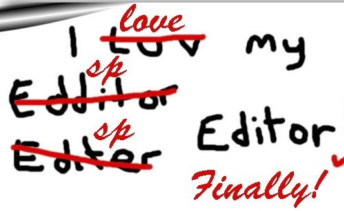 But I’m discovering a whole new level of revising in my interaction with my publisher/editor. She has done one read through where she looked at overarching problems that should be addressed. Now I’m going through her second review that consists largely of line editing. She has found many inconsistencies that are unavoidable in a 350-page work. She also has made numerous suggestions that has helped me to add important detail or to deepen/streamline the narrative. It’s an invaluable experience to have this kind of attentive and intelligent questioning of passages that I thought were complete.
But I’m discovering a whole new level of revising in my interaction with my publisher/editor. She has done one read through where she looked at overarching problems that should be addressed. Now I’m going through her second review that consists largely of line editing. She has found many inconsistencies that are unavoidable in a 350-page work. She also has made numerous suggestions that has helped me to add important detail or to deepen/streamline the narrative. It’s an invaluable experience to have this kind of attentive and intelligent questioning of passages that I thought were complete.
Of course, I resist some of her comments, and I don’t act on all of her recommendations—maybe two thirds. Though she is deeply involved in the characters and action, it is my creation, and she doesn’t know the book in the same way that I do. But, then, that’s my role as the author. Even so, the work is much stronger because of her involvement in it.
From this experience, I’ve discovered how valuable this kind of intensive editing can be. While I gave birth to the world I’ve created, it helps enormously to have a sensitive eye that can assist in the midwifery. I feel I’m receiving an even higher caliber of help in this process than I might have if a large publishing house had purchased the book. Not only is there more clarity, but seeing the characters/situations/settings through a sensitive reader’s eyes gives deeper insight into the work in general.
This won’t be the final edit (a copyeditor will look closely at grammatical/typographical errors next after I go through it again on my own), but it has been more than illuminating. My publisher/editor’s reading has raised the novel to another level, something not all published authors achieve.
Filed under: Links Tagged: bone songs, editing, editors








September 20, 2016
Multi-award winning Texas author Jan Sikes tells true stories in a creative and entertaining way!
As a fellow Rave Reviews Book Club member, I was delighted to discover Jan Sikes. She started writing when she was eight years old. Her first work was a gospel song. She had an uncle whom she loved dearly, but he was an alcoholic whose drinking caused a lot of family problems, resulting in him being banished from their home. That led to her creating a song about her uncle Luke finding Jesus, her first memory of feeling a deep passion for writing.
The stories she has written are true stories about the journey of two people moving through adversity in order to grow and learn to become better humans. She believes there is something worth sharing in these stories, bits and pieces of wisdom, hard-learned lessons, and, above and beyond all, love—true love that you often read about in fiction, yet this is truth! The old saying that truth is stranger than fiction fits the stories that she shares through her writing.
I also was amazed to learn that along with each book, Jan also releases a music cd of original songs that fit the time period of the story. Why? Because the stories revolve and evolve around a passion for music.
North Texas is where Jan calls home. You’ll often find her at Texas music festivals, and she has five incredible grandchildren.
Following are four of Jan’s published works, along with their trailers and how you can purchase them.
From the Texas honky-tonks in 1970, comes a love story so passionate that you feel the heat!
Nothing could have prepared Darlina Flowers for the reckless Texas rogue musician, Luke Stone, to come stampeding into her life like a team of wild horses. Their love ignited into an ever burning flame, enduring a cruel twist of fate and injustice. A compelling true story based on the lives of Rick and Jan Sikes.
FLOWERS AND STONE
BOOK ONE OF A SERIES
$12.95 plus Tax and S&H
To Read REVIEWS posted for Flowers and Stone, Click HERE!
THE CONVICT AND THE ROSE
Sequel to Flowers and Stone
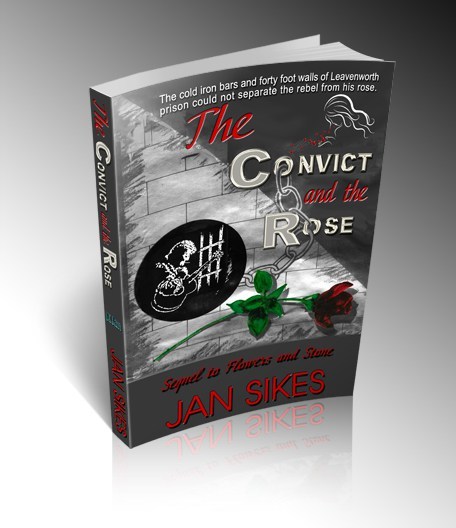
Rebel Texas musician, Luke Stone, loses everything in life that he treasures when he is arrested and convicted of a crime he did not commit. How does a man deal with that kind of devastation? Not only is he locked away in a cage, he’s left behind the woman who holds his heart.
Broken and alone, Darlina Flowers struggles to go on living without the man she loves so completely.
Follow their journey through shackles and chains, drugs and gurus as they fight to find their way to freedom.
The Convict and the Rose inspires hope and shows how anyone can turn a negative dark situation into a positive one. But more importantly, the story portrays a love that goes beyond earthly confines and proves how persistence and faith come with their own sweet reward.
This story is based on true events.
$14.95 Plus Tax and S&H
Also available on AMAZON
To read REVIEWS for The Convict and the Rose! Click Here!
THE CONVICT AND THE ROSE
HOME AT LAST
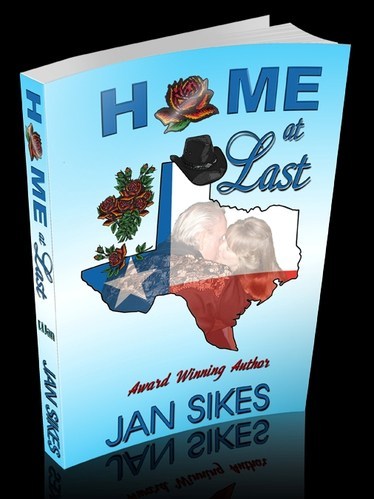
With empty pockets and a heart full of dreams Luke Stone leaves behind the nightmare of fifteen long years in Leavenworth prison, not giving it a backward glance.Eyes firmly on the future, he boards a Greyhound bus bound for Texas…for freedom…for the one who holds his heart. The unjust conviction no longer matters and revenge haunts him no more. Darlina Flowers, the woman who takes his breath away, waits ahead and with her by his side, nothing can stop him.
He is headed HOME AT LAST.
To read REVIEWS posted, click HERE!
Also available on Amazon.com
$14.95 Plus Tax and S&H
HOME AT LAST
‘TIL DEATH DO US PART
TIL DEATH DO US PART
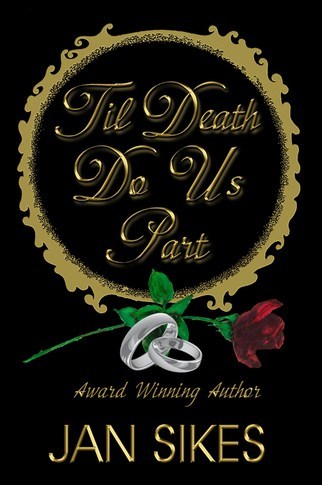
There are only so many grains of sand allotted to each hourglass of life. Facing trials that would destroy a lesser man, Luke and Darlina Stone chose to make the most of each grain as it trickled through. This is a poignant journey of love, faith, hope and perseverance.
$14.95 Plus Tax and S&H
Also Available on AMAZON
TO READ REVIEWS POSTED, CLICK HERE!
TO LEARN MORE ABOUT JAN SIKES AND HER FABULOUS WORK, VISIT HER WEBSITE: http://www.jansikes.com/ AND TWITTER HER @rijanjks.
Filed under: Links Tagged: jan sikes, RRBC, Texas








September 15, 2016
Is Rabih Alameddine’s AN UNNECESSARY WOMAN an unnecessary book?
When I began reading Rabih Alameddine’s An Unnecessary Woman for my reading group, I was sorry we had selected this book. I had read his previous novel, The Hakawati, expecting to love it because it resembled The Arabian Nights in some ways, a work I had absorbed as a young girl. But I ended up hating it for reasons I won’t go into here. When I finally gave up because the narrative was so frustrating, I knew I wouldn’t read anything by this author again.
Luckily, while I had remembered the novel’s name, The Hakawati, I had forgotten the author’s. Otherwise, when one of the women from my reading group chose An Unnecessary Woman, I didn’t demur. And by the time I realized who the author was, I had already purchased book and felt bound to read it.
 My resistance to the writer initially colored my reaction to the story’s main character, Aaliya Sohbia, a 72 year-old Lebanese woman who lives an isolated life in Beirut. Books are her primary companions. Though I was pleased to see a contemporary work that featured an older person, I continued to resist this author and the idea of a male portraying a woman in the first person. I thought he would falter. Yet I ended up being amazed at how he inhabited Aaliya’s personality and created an eccentric type who has a wonderful wit and perspective on life in a war-town city I haven’t visited.
My resistance to the writer initially colored my reaction to the story’s main character, Aaliya Sohbia, a 72 year-old Lebanese woman who lives an isolated life in Beirut. Books are her primary companions. Though I was pleased to see a contemporary work that featured an older person, I continued to resist this author and the idea of a male portraying a woman in the first person. I thought he would falter. Yet I ended up being amazed at how he inhabited Aaliya’s personality and created an eccentric type who has a wonderful wit and perspective on life in a war-town city I haven’t visited.
While Beirut has not been part of my travel plans, I have visited many of the authors and their works that Alameddine weaves into the narrative: Pessoa, Sebald, Bolano, Anne Enright, and so many more. I realized I could have deep, invigorating conversations with Aaliya if we were to meet. She also is a kind of writer herself. One of her yearly rituals is to translate some major works into Arabic, and she handwrites the manuscripts. Yet she never tried to publish these translations. Instead, she stored them in an extra room in her apartment, a secret “vice” that neither family nor friends knew about.
I’ve learned something important from this experience. Just as one shouldn’t judge a book (or a person) by its cover, so, too, one shouldn’t negate an author because s/he may have written an unappealing work. In An Unnecessary Woman, Alameddine demonstrates not only skill at creating a believable, engaging female character, but his own humor, metaphors, and phrasing makes for a satisfying read.
Filed under: Links Tagged: an unnecessary woman, arabian nights, hakawati, novel, Rabih Alameddine








September 10, 2016
Confessions of a Facebook Convert
Until recently, I thought Facebook was for my students, not for serious adults like myself. It was a way for them to interact with other young people and promote their youth culture. I didn’t see any benefit for mature adults with busy lives. It seemed a silly distraction and waste of precious time.
But then I published a novel, and all of the marketing gurus insisted that authors needed to have a Facebook page as part of their platform. They also must join FB groups and regularly interact with others in that medium. I complied and made checking out FB a regular part of my day, including periodic posts that include my blog entries. I visit several different Binders of Women groups (freelance and travel writers, women of a certain age, fabulists, Bay Area binders) as well as those that have similar interests, like magical realism and other groups for women writers.
 A strange thing happened. While I know some of the people outside of the FB world that I have become friends with there, many aren’t part of my everyday life, and I don’t interact with them outside of FB. However, I’ve discovered that even strangers from that milieu have become a peripheral part of my life. It’s a little like reading a novel where you engage with various characters as you read. They don’t actually exist outside of the narrative, but they take on significance as you learn more about them, lingering in your unconscious when you finish the book.
A strange thing happened. While I know some of the people outside of the FB world that I have become friends with there, many aren’t part of my everyday life, and I don’t interact with them outside of FB. However, I’ve discovered that even strangers from that milieu have become a peripheral part of my life. It’s a little like reading a novel where you engage with various characters as you read. They don’t actually exist outside of the narrative, but they take on significance as you learn more about them, lingering in your unconscious when you finish the book.
I eventually realized I had become part of a community, even though most people aren’t posting things that are particularly revealing. Even so, I get a sense of the person and what he/she is like and begin to feel a connection to him/her. One women posts images of her vibrant paintings. Another shares photos of the many different sunsets she has seen over a lake she visits each summer, communicating the amazing variousness of a daily occurrence. Others share valuable information about politics and health that I might not have found elsewhere. FB is like living in a neighborhood where we only get glimpses into one another’s lives through our windows/posts, but those peeks bind us together though common interests.
I don’t know if FB has helped me to sell any books, but it has introduced me to individuals I otherwise would not know. Some are also using FB to market their products. But others seem genuinely interested in the various posts they receive. I’m happy to confess that I’ve become one of the latter, so do become my friend on FB!
Filed under: Links Tagged: facebook












